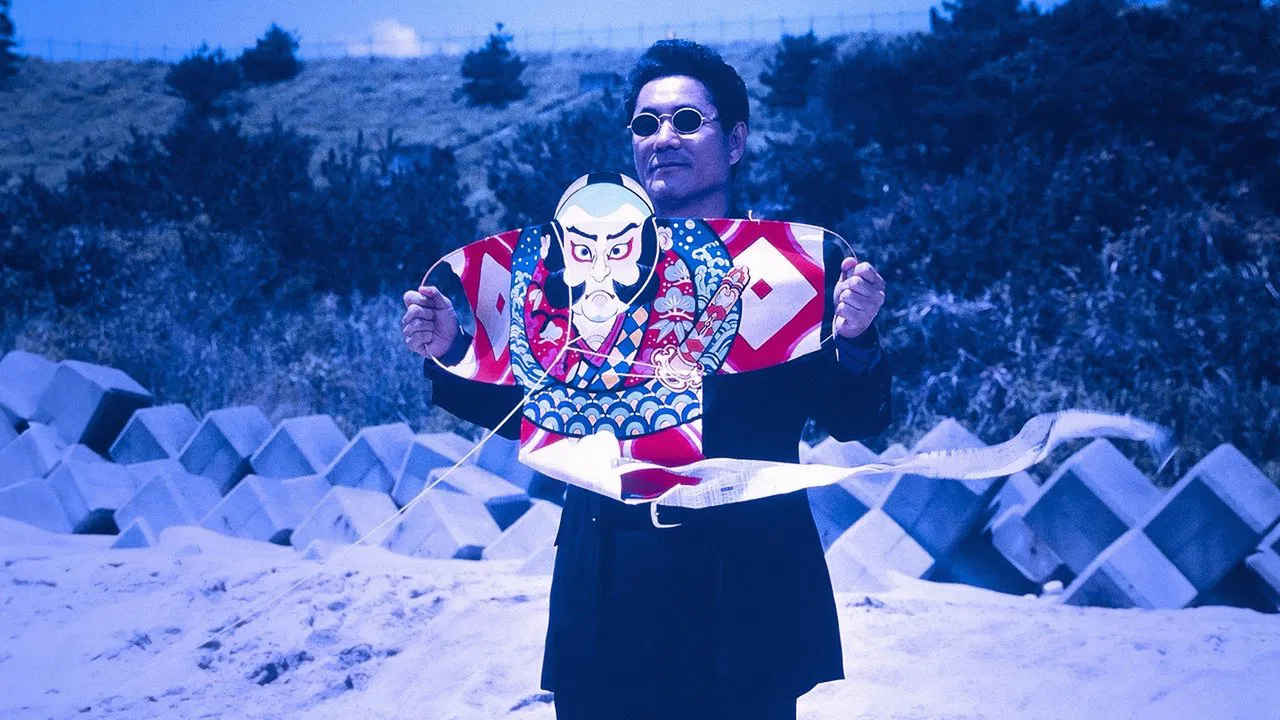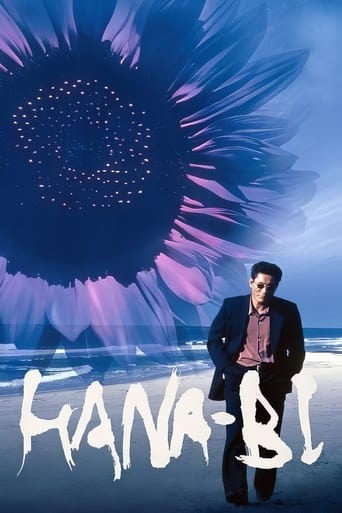

I found this Japanese film in the book 1001 Movies You Must See Before You Die, I obviously would not have known about it without the book, I hoped it would be a deserved entry. Basically Yoshitaka Nishi (Takeshi's Castle star Takeshi Kitano, also directing) a violent and unpredictable police detective, his wife Miyuki (Kayoko Kishimoto) is slowly dying of leukaemia. On the job one of Nishi's partners, Horibe (Ren Ôsugi), gets shot, causing him to become wheelchair bound for the rest of his life, the partner also becomes suicidal, Nishi feeling guilty and blaming himself after the accident tries to help Horibe any way he can. At the same time Nishi leaves the force, in retirement he spends more time caring for his wife, but he needs more money to pay for her needs, so he is borrowing money from transnational organised crime syndicate the Yakuza. Over time Nishi finds it difficult to pay back the dangerous criminal organisation and slowly suffers the consequences, Horibe meanwhile is trying to come to terms with his disability, he takes up painting and creates surrealist artworks. Also starring Susumu Terajima as Detective Nakamura, Tetsu Watanabe as Tesuka (junkyard owner), Hakuryû as Yakuza Hit-man, Yasuei Yakushiji as Criminal (killer on the loose), Tarô Itsumi as Detective Kudo (young cop) and Ken'ichi Yajima as Doctor. The title is translated as "fireworks", this I agree with critics is a detective film with a difference, it has sensitivity most of the way, I admit I was paying much more attention to the action, including really violent and gun-filled sequences, but overall it does well with the human element, all in all it's a watchable crime drama. Good!
... View MoreThis is certainly a Kitano film, through and through. Art, long takes, close ups, silent characters, sudden violence, and wacky humour. It's all here. I have seen many say that Hana-bi is Kitanos best film, but I would probably disagree and say Sonatine is. I feel that the films are quite similar, but Sonatine just does it better. That's not to say that Hana-bi isn't a great movie. Kitano plays a very similar character to his other films. A silent and violent cop who retires from the force due to a certain incident and the fact that his wife is sick. He plays the character well and you certainly feel the pain he is experiencing. What I found slightly strange about the film was the side plot of the partner who was injured and starts to paint to keep himself busy. We keep cutting back to this story, and I couldn't quite place the significance. Looking at it from a very basic point of view, it does nothing to help the plot. Obviously it has a deeper meaning to it, but I can't quite understand it myself. I think I would need to analyse the film more. I almost feel like it may be some kind of personal statement by Kitano. He was involved in a car crash in real life and began to paint after it. Perhaps parts of this film, if not all, is about Kitanos accident and the feelings he had after having a near death experience. That would explain a lot. I feel overall, Sonatine does a better job of doing what Hana-bi tries to do. Sonatine has similar themes, but displays those theme more clearly and concisely, while Hana-bi is much more up to your own interpretation at times. Also, the humour in Sonatine works perfectly, while it feels out of place many times in Hana-bi. That's not to say the humour isn't funny. I actually found it extremely funny (especially a scene involving a camera on a timer), but it just felt quite out of place at times. In the end, Hana-bi feels like a lesser version of Sonatine. Even though Hana-bi came after, I just found myself thinking "Sonatine did it better". I got goosebumps from Sonatine, but not Hana-bi. But I think it might be a matter of opinion, and I think this is a great film that should be seen.
... View MoreNishi is a cop who is very good at his job but whose personal life is impacted with loss a dead child and now a dying wife. When his partner is put in a wheelchair by a criminal and another officer is shot dead, Nishi finds himself plagued by guilt over his part in it all. Blaming himself Nishi tries to do the right thing by his partner Horibe and the widow of cop, while also trying to salvage some happiness in what remains of his time with his wife.I came back to Takeshi Kitano about the same time as I left the Movies You Should See podcast. I left it because I don't think it is as good as it could be and at times offers no real insight into a film other than describing "bits" however I give them a mention because they reminded me that I had only ever seen one or two of Kitano's films and that it had been some time since I had even seen those. So it was that after watching Brother, my rental site threw me Hana-Bi and I was looking forward to it due to the praise on this site and indeed the podcast itself. The expectation was not unjustified as Hana-Bi is a film of pain and beauty that is well worth seeing even if it is not the image of perfection that some would have you believe.That statement is bound to attract a low vote on IMDb but what can I tell you? That it was slow and quiet is not a problem for me but it is a feeling you get watching the film and it is not helped by some scenes feeling irrelevant within the context of the story. This is not a real killer but I felt that the slow pace needed support and seeing two minor characters argue about a fender bender (for example) saw my interest dip and the slow pace start to be felt. Otherwise though, the silence and pace suits the material and the style of the film. The violence is quite subdued (in regards what you actually see) because it occurs in the edit of the action so the actual impact is mostly unseen. It doesn't matter though because the main thrust of the film is less the outward violence but the internal suffering of all the characters. The film does wear this aspect a little heavily at times and some will feel that some sequences are right on the edge of being pretentious and there is no point in denying that it does walk this line here and there.However for the majority it is a really well observed and emotionally engaging story built on the silent but emotive presence of Kitano as writer, director and star. As writer he has, it could be argued, left a lot to the actual making process itself since the script must have been a few pages. As director he sets the pace and I like the way his static style works within this story but it is his work as actor that always mystifies and impresses me. How he can convey so much while also appearing to be doing nothing at all I'm not sure but it somehow works and fits his style in other disciplines. He is well supported by Kishimoto, with whom he has genuine chemistry without betraying his character's nature. Osugi is not that great and it is with his character that I found the film close to being pretentious, not the actor's fault of course but I never felt for him as I did for Nishi.Hana-Bi is very slow and quiet and I can totally understand why some viewers will throw it in very early on. However sticking with it reveals a film that manages to be violent, introspective and emotionally engaging at the same time, all wrapped in the style of Kitano, who is creative across the board.
... View MoreTakeshi Kitano, the actor and director of Hana-bi certainly has left an imprint on Asian cinema. Managing to differ between playing brutal, yet sensitive characters to directing films centred on hard-boiled, "cops vs. criminals" plots. Takeshi Kitano remains one of the finest actors in cinema, most film viewers were introduced to his acting after watching Battle Royale, which has had a huge effect of his recognition. He is an actor who can bury himself deep inside a role, becoming a dark, disillusioned character and being cast as characters who are usually coming to terms with the guilt of their past. Well known for his deadpan style he has developed into an icon of modern Asian cinema.Hana-bi is the haunting, powerful, thoughtful tale of a severe police officer who retires from the force after his wife gets leukaemia and a fellow officer gets paralysed from an accident that he blames himself for. The film follows the tragedy and self-destruction in the man's life who wants to help the people he loves before it is too late. The narrative of Hana-bi is one that moves with a fairly slow grace, perfectly suiting the film's mood and structuring a detailed and enigmatically twisted plot.Hana-bi is a prime example of minimalist film-making, providing a poetic journey of self-discovery and accepting the effects of anger. Hana-bi is far from an aggressive film, even though the violence is stark, abrupt, restrained, brutal, unflinching and at times strangely beautiful in its film techniques. The literal translation of the title "Hana-bi" translates to fireworks, which is a metaphor for the brief explosion of life we live. The pensive feel is relaxing rather than brooding, flooded by sudden flashbacks of violence, which wonderfully grab the viewer's attention. There is also an element of dark humour paced throughout the film, which makes you laugh, but also makes you ponder the film's deep philosophical, moralistic and nihilistic imagery.The acting from the entire cast is stunningly provocative and moving, edged with the factor of such a brilliant script, yet it is a film that does not rely on language as a key factor. Few performances have moved me with such provoking and eventually challenging studies of human characteristics, emotion and psychology. The metaphorical, subliminal and emblematic cinematography is marvellous at carefully capturing some of the most unforgettable imagery in cinema. The haunting score is truly remarkable n its aching sophistication and elegance, ultimately helping define a clear atmosphere. It is undoubtedly a pessimistic film on the surface, although still being a film that holds hope under the façade.Hana-bi is perfect cinema. Few films come quite as close to its breathtaking brilliance and overwhelming nature. Sublime, in every sense of the word, its beauty will knock you right out.
... View More